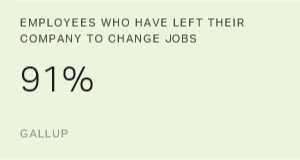In today's culture where we can tailor our news, communication and technology, it is no surprise that more and more employees expect to have the ability to tailor their work schedule by working from home. Workplace flexibility is becoming more commonplace as employees who work remotely comprise 39% of full-time employees, and 15% of them work from home all the time. There are measureable benefits from working remotely, such as the ability to recruit and retain employee talent from distant locales, enhanced work/life balance and a reduction in employee commuting time. But there are also challenges that come along with being an engaged employee who feels connected to the company -- especially when an employee primarily works from home. I would know; I've been working remotely for nearly three years.
I'm a career woman at heart. I feed off a challenge, a good debate and a hearty discussion. Ultimately, I want to give back to others. But, I'm also a wife and a mother. My husband is in the military, so you can imagine how difficult it has been to build a career when we move every three to four years. In 2012, I received the difficult news that my husband had been reassigned from Nebraska to Louisiana. I thought I was going to have to leave my job and start over, but my company responded with an offer to let me work from home. This was a huge relief for me, though I'd soon find out that it would prove to be a difficult adjustment.
Going from the office environment to a home office required a shift in the way I approached my work, structured my day and interacted with coworkers, all of which impacted my engagement. While my coworkers, manager and partners have played a large part in my engagement, I realized that I also needed to shift how I managed and owned my personal engagement.
I found four key areas that helped:
1. Clarifying expectations: Perhaps the most basic employee need is the need to know what is expected of her. However, on average, only half of all workers, both on-site and remote, strongly agree that they know what they are supposed to do at work. I have found that knowing what is expected becomes even more challenging when working remotely.
While my job description and performance outcomes are quite clear, the lack of hallway conversations means I receive less informal feedback about the current status of our work (i.e., who is working on which projects, which tasks have been achieved, what conversations have reshaped our priorities, etc.). To mitigate this uncertainty, I am much more intentional about proactively scheduling regular check-ins with my manager and key partners. These scheduled conversations are often quick, but an effective way of understanding how my work fits into the broader team picture and current state of work.
2. Initiating feedback and communication: A nod of approval, a look of discontent, a smile of agreement -- all the nonverbal cues one typically receives in person are absent from most of my communications. For this reason, I have found that I do best when I proactively seek feedback on my performance and reach out to colleagues during times of organizational change.
Without being able to physically see my activity and behaviors, it can be easy to confuse the silence with a lack of actual work. Providing progress or completion updates is a reminder to others that I am working despite not being visible in the office. Equally as important is sharing personal successes and accomplishments that may go unnoticed. I have admittedly found times when I feel undervalued, only to realize that I did not sufficiently communicate the progress I made. Receiving recognition for good work is a key element of engagement, but if others do not know what you are working on, recognition is hard to come by.
3. Investing in relationships: When employees work remotely, it is much more difficult to sustain working relationships. In fact, Gallup's research shows that remote workers score less on the "best friend" item, so I suspected this was going to happen. However, the slippage in my relationships was one of the most noticeable differences when I moved from the office to a home environment.
Because my partnerships are not as easy to sustain as before, I have to be more intentional about investing time and energy into interactions that build strong relationships. Technology is my savior here! While some may feel the use of technology depersonalizes social interactions, sending an instant message to say hello, using video conferencing instead of a phone conference so that faces can be seen, and even using social media to stay in touch with work friends have all been beneficial. Being reliable and delivering quality work is also especially important, so my team can trust me professionally and personally.
4. Finding a balance: While working remotely is touted as offering more of a work-life balance, I find that this balance can be a tightrope walk when working from home "all of the time." Admittedly, there have been weeks when I hardly left the house, glued to my computer and tasks. On the plus side, I am dedicated to the job and get to do what I do best every day. On the downside, my stress levels can overrun my household and my well-being seems to suffer when I don't effectively manage my day.
This experience is consistent with Gallup's research that found workers who spend some of their time working remotely log more hours than their counterparts, and U.S. workers who spend more hours working remotely outside of normal working hours are more likely to experience a substantial amount of stress.
It seems easy to simply get back to my family and friends when the work is done; however, like dishes and laundry, when you work from home, the job is never done. I have to find ways to help me truly unplug. For me, this means going for a walk, turning on the news or even working from a coffee shop.
Working from home is a privilege and one that has allowed me to continue to dedicate myself to both my company and family. I am forever grateful to my company for this opportunity. However, companies need to know that there is a point of diminishing returns for engaging remote workers, as those who spend more than half of their time or all of their time working remotely have higher levels of disengagement than their counterparts. To offset this trend, I believe it takes a personal commitment from the individual employee to own their engagement.
Anne Maltese, a Client Service Advanced Consultant at Gallup, contributed to this piece.


